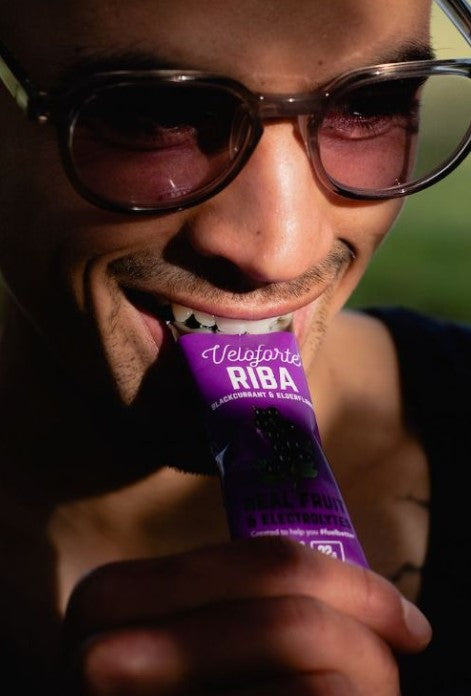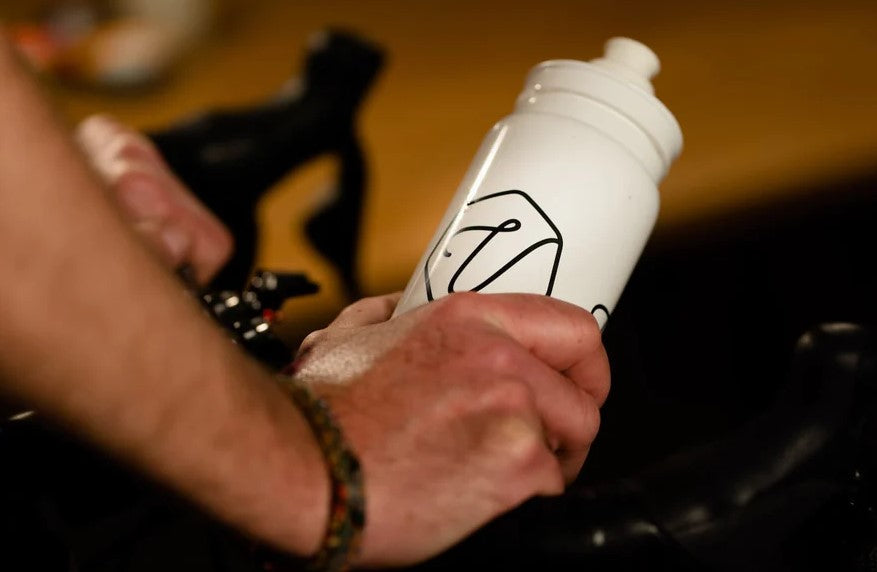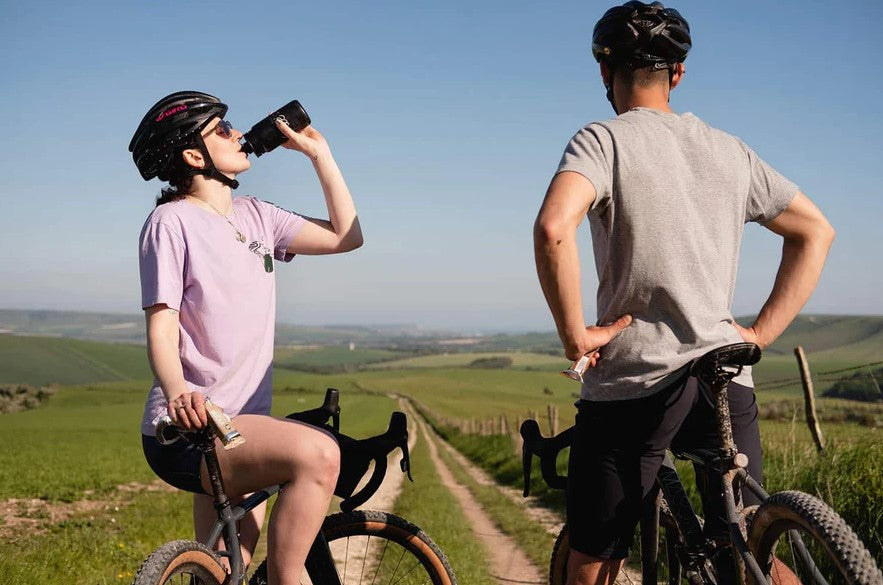Nutrition for Long Distance Runners: Here’s What You Should Eat

When it comes to long distance running nutrition, if you’re running for up to an hour, a good balanced diet should supply everything you need to power your efforts. But the moment you push beyond the 60-90 minute mark, fuelling your runs – and recovery – takes on a whole new importance.
When you up your distance – maybe training for a half marathon, full marathon or even longer – you need to get smart about what you eat. However, choosing the best food for long distance runners can be a complicated business.
Luckily, we’re here to help simplify things, so you can build an effective run-fuelling strategy to get you to the finish line.
Read on for our complete guide to nutrition for long distance runners.
Download the ebook above.
Important nutrients long distance runners need
Carbohydrates
Carbs are your main running fuel. The body converts the carbs you eat into glucose which is used to power your runs or stored in the muscles and liver.
Your body’s limited storage tanks hold between 300 and 600g of glycogen and take between 60 and 90 minutes of running to empty. That means for runs longer than 90 minutes, you need to top up your fuel tanks with extra carbs. Failing to refuel is a one-way ticket to Bonksville.
For a convenient way to top up your carbs on the run, Veloforte’s energy gels (22g carbs), soft-chews (41g ) and energy bars (40g carbs) all pack a powerful and delicious energy punch.

Most runners can ingest 30-60g carbs per hour, though with the right gut training and the right dual-fuel carb sources, research shows it is possible to boost that to 90g per hour.
Restocking depleted glycogen stores post-run is also important for effective recovery.
Protein
Protein is an essential building block for muscle repair and growth. It also supports the uptake of glycogen, helping to refill your fuel tanks after longer running efforts.
Individual protein requirements vary, depending on physiology and the duration and intensity of your runs.
To give your body a steady supply of building materials, you should aim to consume 0.4 grams per kilogram of bodyweight at each meal. For example:
-
55kg runner =22g protein
-
65kg runner = 26g protein
-
75kg runner = 30g protein
-
85kg runner = 34g protein
For an immediate recovery boost, reach for a post-run protein bar or a shake, with 3:1 ratio carbs and prioritise complete proteins with all 20 sources of amino acids.
Veloforte’s Mocha or Forza protein bars and our Vita and Nova post-run protein shakes, deliver a convenient – and delicious – hit of complete proteins.

Fat
Many people think fat is the bad guy. But while the saturated fats in cakes, biscuits, cakes and crisps aren’t your friends, the body needs mono- and polyunsaturated fats to function.
These so-called good fats, found in avocados, nuts, seeds and oily fish help transport vital vitamins and minerals, including vitamin A, K, D and E. All of which play a role in supporting strong immunity and boosting recovery from your long runs.

Electrolytes: Sodium, potassium, magnesium, chloride and calcium
Electrolytes are minerals in your body that have an electrical charge. As a mix they support normal bodily functions and processes crucial to long-distance running. For example, helping with hydration, regulating nerve and muscle function, blood pressure and PH levels. They even play a role in rebuilding damaged tissue.
The problem: we lose electrolytes when we sweat during runs, particularly sodium.
Topping up before, during and after runs helps maintain your levels but it can also help to add some electrolytes to your regular water too. Carefully balanced electrolyte powders, like the Veloforte Vivo, Attivo and Solo offer a convenient and delicious way to maintain these vital minerals. Low-carb Solo is the best option for targeting hydration.

How much should you eat? How many calories?
How many calories you torch while running – and how many you should eat to power your runs and recovery – varies from person to person. Physiology (weight, height, age, gender) and metabolism are two major factors. Weight also plays a significant role in your burn rate, because it takes more energy to move a heavier body.
Pace – or intensity – are also important. Loosely speaking the faster you go, the more you burn, particularly if you’re hitting higher intensity intervals that can cause the afterburn effect. So-called because your body continues to use energy after you stop running.
However, as a rule of thumb, a mile burns around 100 calories whether you’re doing it in 7 or 10 minutes and the average runner will burn through somewhere between 500 and 1,300 calories per hour.
It’s not necessary to replace all of these calories while running, particularly if you’re hoping to shift some timber. However, you will need to ensure you have enough energy in the tank to power your runs beyond 60-90 minutes.
If you’re hitting the recommended 30-60g carbs per hour at this point, you’ll likely be taking onboard anywhere between 120 and 240 calories an hour.

Best types of food for long distance running
That’s the basics of running nutrition covered. Now it’s time to talk about the best food for running long distances. Expect some trial and error before you find the fuel sources that work for you.
Here’s where to start:
What to eat the night before running long distance
The days and night before a long run, you’ll want to add a small amount of extra carbs to your diet. This doesn’t have to be with your main meal and it’s important not to overdo it.
-
Avoid refined carbs and don’t eat your dinner too late as both can disrupt sleep.
-
Don’t suddenly reach for foods that you wouldn’t usually eat. Or anything you know will leave you feeling heavy, sluggish or bloated the following morning.
-
Simple and familiar is the smart way to go. With a balance of carbs (the usual suspects apply here, pasta, sweet potatoes, rice), lean protein (chicken, fish, tofu) and nutrient-rich veg (broccoli, cauliflower, carrots).
-
Avoid having alcohol or late caffeine with your meal too. These are the enemies of restful sleep.
-
Top up your hydration levels with small amounts of water but avoid guzzling litres after sundown. Unless you want sleep-hindering late night loo trips.

What to eat before running long distance
Unless you’re trying something new in training, the best food to eat before a long distance run tends to be something you’ve eaten before without trouble. This is often breakfast but there are a few rules to follow for lunch or mid-afternoon eats as well.
What you eat should:
-
Be convenient and often quick to make and eat
-
Be easy to digest
-
Provide a small top of your carbs stores
-
Help you feel satisfied and satiated but not heavy during your run
What to eat before long distance run, some popular options:
-
A bowl of porridge oats with some fruit, honey or peanut butter.
-
A convenient energy bar like those in the Veloforte Energy Bars range.
-
A smoothie or a meal replacement shake.
-
Toast with jam, peanut butter, mashed banana or even all three.

What to eat during a long distance run
The best food for long distance runners is simple to carry, easy to digest and delicious enough to make you want to eat it, even when you’re pushing your body outside of its usual snacking comfort zone (aka the sofa).
What you eat will depend on the intensity and duration of your long run. You’ll also need a way to carry it. We’ve pulled together a list of the best running gel belts to help.
Gels: During a marathon-paced 18 miler, energy gels for running are the classic go-to. Compact, portable and packed with high energy with a consistency that makes them easier to digest on the move.

Bars/chews/dried fruit
If you’re running at a lower heart rate, perhaps with walking breaks, energy bars for runners, chews or even dried fruit like dates, and apricots can work well. They take a little more chewing and a lot more digesting.

Energy drinks
If you’re running with bottles or soft flasks, this is an easy way to top up your carb intake. Veloforte’s Vivo and Attivo electrolyte drinks pack around 22g carbs per 500ml.

What to eat after long distance running
Once you’ve stopped your running watch and flopped through the front door, the first thing on your list should be providing your body with the protein it needs for muscle repair. Along with carbs to replenish depleted glycogen stores and help support the protein synthesis that rebuilds damaged muscles.
Long-distance run recovery: fuelling quick wins
Protein bars
Small, convenient and running belt friendly, these are great for getting that extra protein you need to help your muscles recover. Look for a carb:protein ratio of 3:1, like Veloforte’s Forza and Mocha bars.
Recovery shakes
The protein shake is a double whammy – a guaranteed, measured hit of fast protein and some fluids. Veloforte Vita and Nova shakes are packed with complete proteins and, unlike some recovery shakes, they’re also tasty. So you’ll actually look forward to them as a bit of a treat at the finish line.

Long-distance run recovery: The long game
When your stomach is settled enough to switch back to meals, make sure you’re adding a good source or lean protein to your plate. If you’ve run in the morning, add a little extra to your lunch and dinner.
Here are a few quick and easy high-protein foods you can add on the side:
-
1 x egg = 13g
-
100g chicken breast = 31g
-
100g raw mixed nuts = 20g
-
100g cottage cheese = 11g
-
100g peas = 5g
Important: Don’t forget hydration
Good hydration habits are a cornerstone of optimal health. And the minute you start upping the distance, duration and intensity of your long runs, replacing fluids and electrolytes you lose through sweat, takes on even greater importance.
Even low levels of dehydration can hinder performance and affect mood. Just 5% dehydration can result in up to a 30% reduction in performance. That’s the difference between a 45-minute 10k and crossing the finish line just shy of an hour.

To avoid being an underperforming, grumpy runner, follow these three simple running hydration tips:
- Start your long distance runs well hydrated. This doesn’t mean guzzling two litres of water an hour before you run. Build a regular hydration habit but pay particular attention in the days leading up to a longer run.
- During runs, replace lost fluids and electrolytes in a steady, balanced way, paying attention to your own thirst and the conditions.
- After your runs, aim to take on 150% of the fluid you’ve lost through sweat within one-to-four hours.
Veloforte Solo is perfect for targeting rapid hydration before, during and after long runs. It’s rich in sodium, potassium and other natural electrolytes, low in carbohydrates and the coconut-water base is easier on the stomach than traditional sports drinks. It’s also low in calories and delicious, making it the perfect way to enhance your regular daily water intake too.

Got a thirst for running hydration knowledge? Take a look at our detailed guide to good hydration for runners.
End-to-end fuel for your next long distance run
That’s our guide to nutrition for long-distance runners. Now that you have the basic foundations to build your own long distance running fuelling plan, it’s time to stock up and start experimenting.
To find the best mix of gels, bars, chews, recovery shakes and energy drinks that work for you, Veloforte Mixed Pack bundles are a great place to start.
And for vegans, the Vegan Complete Pack offers a selection of our best plant-based fuel for running and recovery.
![]()


